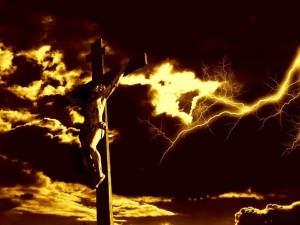 There are so many facets to the events of Good Friday, the atonement for sin through the death of Jesus on the cross. I want to comment today on just one: the moment when God the Father turned away, leading to Jesus’ cry, “My God, why have You forsaken Me?” Theological interpretations of what exactly occurred at that moment are many, but only one resonates with me.
There are so many facets to the events of Good Friday, the atonement for sin through the death of Jesus on the cross. I want to comment today on just one: the moment when God the Father turned away, leading to Jesus’ cry, “My God, why have You forsaken Me?” Theological interpretations of what exactly occurred at that moment are many, but only one resonates with me.
Consider: God the Father, God the Son, and God the Holy Spirit had been in constant communion throughout eternity past all the way to this crucial moment on the cross. Perfect love existed in this triune relationship, and it never had been disrupted. When God the Father, in essence, abandons Jesus to go through the agony of the atonement all alone, that would have been the only time the Son would have experienced what it means to be utterly lost, cut off from the loving, sustaining presence of the Father and the Spirit. Can you imagine the sense of “lostness” he must have felt? Without the presence of God the Father and the aid of the Spirit, He was left hanging there, both literally and spiritually.
Why was this necessary? I believe that in order for Jesus to be the perfect substitute for sinful humanity, he had to go through everything we do. The book of Hebrews makes it clear that He suffered as we do, and that He was subject to all the same types of temptations. He truly came to this earth to experience what it is like to be human. Each one of us knows what it means to be lost, cut off from the life of God. We are desolate, miserable creatures until we finally find our life in Him. And if we die without coming to grips with our sin and without receiving the forgiveness so abundantly provided through the atonement, we will then face eternal despair and regret, severed from the One who loves us supremely. Of all the descriptions of hell, the one that strikes me the most is the picture of a soul eternally without hope, eternally separated from the comfort and grace that was offered so freely, along with the agonizing knowledge that it didn’t have to turn out this way. Eternal regret.
Jesus, I believe, had to experience that same kind of separation to identify fully with us. God the Father did not turn away in disgust because Jesus represented sin; the Father looks upon sinful people constantly and continues to reach out to them. The cross, instead, was a demonstration of just how far the Trinity was willing to go to heal the brokenness of man. The book of Hebrews makes it clear:
Therefore, He had to be made like his brethren in all things, so that He might become a merciful and faithful high priest in things pertaining to God, to make propitiation for the sins of the people. For since He Himself was tempted in that which He has suffered, He is able to come to the aid of those who are tempted. . . .
Therefore, since we have a great high priest who has passed through the heavens, Jesus the Son of God, let us hold fast our confession. For we do not have a high priest who cannot sympathize with our weaknesses, but One who has been tempted in all things as we are, yet without sin.
Therefore let us draw near with confidence to the throne of grace, so that we may receive mercy and find grace to help in time of need.
May we indeed. That’s why this is called Good Friday.
